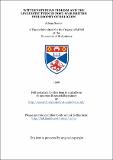Files in this item
Wittgensteinian fideism and the linguistic turn in post-war British philosophy of religion
Item metadata
| dc.contributor.author | Souter, Adrian | |
| dc.coverage.spatial | iii, 151 p. | en_US |
| dc.date.accessioned | 2018-06-29T15:49:15Z | |
| dc.date.available | 2018-06-29T15:49:15Z | |
| dc.date.issued | 1998-08 | |
| dc.identifier.uri | https://hdl.handle.net/10023/14759 | |
| dc.description.abstract | The intention of this dissertation is to provide a descriptive account of the changes that occurred in British philosophy of religion after it began to be influenced by the so- called 'revolution in philosophy' in the nineteen fifties. This had produced a re-invigoration of empiricism in mainstream philosophy in the early decades of the twentieth century, and had led to an interest in the nature and status of the meaning of language, and the means by which this meaning could be justified. This debate entered the philosophy of religion in the form of the verification principle, which denied meaning to any language which could not demonstrate how it was to be verified. Some philosophers were then criticised for allegedly utilising the later philosophy of Ludwig Wittgenstein and claiming that religion was what he meant by a language-game or a form of life, and that meant religious belief could only be criticised by criteria that arose within the same language-game or form of life, so denying validity to any criterion that attempted to adjudicate meaning in all forms of discourse. The work of the philosopher most often associated with this position, D.Z. Phillips, will be discussed, and an argument made that this is an inadequate characterisation of his work. An account will then be given of what Wittgenstein himself understood by the terms, language-game and form of life, and that in fact this possible interpretation raises the possibility that what is signified by these terms may have the unavoidable effect of opening up religious language to criticism of a kind related to the empiricist critique, rather than closing it off. | en_US |
| dc.language.iso | en | en_US |
| dc.publisher | University of St Andrews | |
| dc.subject.lcc | BD573.S7 | |
| dc.subject.lcsh | Religion--Philosophy--History--20th century | en |
| dc.subject.lcsh | Wittgenstein, Ludwig, 1889-1951 | en |
| dc.title | Wittgensteinian fideism and the linguistic turn in post-war British philosophy of religion | en_US |
| dc.type | Thesis | en_US |
| dc.type.qualificationlevel | Masters | en_US |
| dc.type.qualificationname | MPhil Master of Philosophy | en_US |
| dc.publisher.institution | The University of St Andrews | en_US |
This item appears in the following Collection(s)
Items in the St Andrews Research Repository are protected by copyright, with all rights reserved, unless otherwise indicated.

